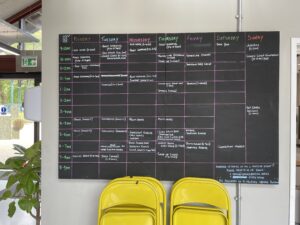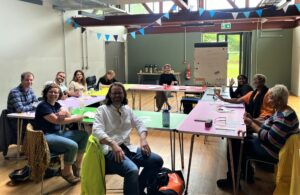Had enough of ‘consultation’? / Wedi cael digon o ‘ymgynghori’?
Do you have a problem with the word ‘consultation’? Or the phrase ‘hard to reach’? Have you had enough of people trying to make a ‘real impact’ in your work? Or to ‘up-skill’ people in your neighbourhood?
If you have, then you are not alone!
These are all words and phrases that have came up as ‘triggers’ in consultation; words and phrases that have become problematic when talking to local ‘communities’ (another catch-all), which we discussed recently as part of the advisory group of the CCQOL Community Voices Cardiff.
“We shouldn’t be consulting, we should be engaging on the vision for our neighbourhoods and cities,” said Aisha Ali, from Cardiff Planning, who helped in the bid to realise the award-winning Grangetown Pavillion, where the Community Voices Cardiff project is based and has been holding an urban room for the past month.
“I am NOT hard to reach,” insisted Liz Musa, a resident of Butetown and veteran of numerous consultation processes.
“No, people are not hard-to-reach,” added Sian Bradley, an architect who works for Housing Justice Cymru, “They’re just easy to ignore.”
“When I hear an organisation is making a real impact, all I can think is of is a car crash,” said Shoruk Nekeb, a student researcher and Director of the Grangetown Pavillion youth forum.
“By saying you are going to ‘break barriers’, you have unconsciously erected one that may not have even been there,” said Ruchit Purohit, Researcher for the CCQOL project.
So what’s the alternative? we pondered.
What is ‘working together’, or what should it be? Who’s working, for a start, and who’s being recognised for their work? Who’s contributing and who’s being paid?
Such phrases simplify power dynamics and get in the way of listening, understanding, showing compassion, building relationships. Instead of making a ‘real impact’, perhaps we could be more specific about the effects or changes, good or bad, to a place, whether that’s the amount of air pollution, the effectiveness of local services or the life expectancy relative to other postcodes.
“We could start a conversation for change that is more relaxed and less hierarchical,” said Yaina Samuels, of Adferiad Recovery. “Look in the mirror and address your unconscious biases. Don’t bring them to the table.”
Simplifying communication is key, as organisations such as Civic Square do through their practice – not by treating people like they’re stupid, but by making messages that are still rich and full of meaning, but understandable above all. “If you can’t understand something that falls on your doormat, then people will just bin it.”
 Image: the Grangetown Pavillion, Cardiff
Image: the Grangetown Pavillion, Cardiff
So what of ‘consultation’, the word that defines and determines so much of the dialogue that is meant to happen between organisations and the public?
Mark Drane, who runs Urban Habitats and works across health and urban planning, felt that the reality of ‘consultation’ is: “let us take up your time and not pay you, then ignore what you said, then gaslight you by saying we’ve consulted with you… It should be: “I share my power with you and support you to change things for you.”
With you and for you. Wouldn’t that be great?
 Image: Artwork at the Grangetown Pavillion, Cardiff
Image: Artwork at the Grangetown Pavillion, Cardiff
Cymraeg
Oes gennych chi broblem gyda’r gair ‘ymgynghori’? Neu’r ymadrodd ‘anodd ei gyrraedd’? Ydych chi wedi cael digon ar fobl yn ceisio gwneud ‘effaith go iawn’ yn eich gwaith? Neu o ‘uwchsgilio’ pobl yn eich cymdogaeth?
Os ydych chi, yna nid ydych chi ar eich pen eich hun!
Mae’r rhain i gyd yn eiriau ac ymadroddion sydd wedi codi fel ‘sbardunau’ mewn ymgynghoriad; geiriau ac ymadroddion sydd wedi dod yn broblemus wrth siarad â ‘chymunedau’ lleol (un arall sy’n hollgynhwysol), a drafodwyd gennym yn ddiweddar fel rhan o grŵp cynghori Lleisiau Cymunedol CCQOL Caerdydd.
“Ni ddylem fod yn ymgynghori, dylem fod yn ymgysylltu ar y weledigaeth ar gyfer ein cymdogaethau a’n dinasoedd,” meddai Aisha Ali, o Cardiff Planning, a helpodd yn y cais i wireddu Pafiliwn Grangetown gwobrwyedig, lle mae prosiect Lleisiau Cymunedol Caerdydd wedi’i leoli ac wedi bod yn cynnal cynllun ystafell drefol yn ystod y mis diwethaf.
“NID wyf yn anodd cyrraedd,” mynnodd Liz Musa, preswylydd Butetown sy’n hyddysg fel ymgynghorydd prosesau.
“Nid yw pobl yn anodd eu cyrraedd,” ychwanegodd Sian Bradley, pensaer sy’n gweithio i Housing Justice Cymru, “Dim ond yn hawdd eu hanwybyddu.”
“Pan glywaf fod sefydliad yn cael effaith go iawn, y cyfan y gallaf feddwl amdano yw damwain car,” meddai Shoruk Nekeb, ymchwilydd myfyrwyr a Chyfarwyddwr fforwm ieuenctid Pafiliwn Grangetown.
“Trwy ddweud eich bod yn mynd i ‘dorri rhwystrau’, rydych chi wedi codi un yn anymwybodol nad yw wedi bod yno hyd yn oed,” meddai Ruchit Purohit, Ymchwilydd ar gyfer y prosiect CCQOL.
Felly beth yw’r dewis arall? fe wnaethon ni ystyried.
Beth yw ‘gweithio gyda’n gilydd’, neu beth ddylai fod? Pwy sy’n gweithio, i ddechrau, a phwy sy’n cael eu cydnabod am eu gwaith? Pwy sy’n cyfrannu ac yn cael eu talu?
Mae ymadroddion o’r fath yn symleiddio dynameg pŵer ac yn mynd yn y ffordd o wrando, deall, dangos tosturi, adeiladu perthnasoedd. Yn hytrach na chael ‘effaith go iawn’, efallai y gallem fod yn fwy penodol am effeithiau neu newidiadau, da neu ddrwg, i le, boed hynny’n faint o lygredd aer, effeithiolrwydd gwasanaethau lleol neu’r disgwyliad oes o’i gymharu â chodau post eraill.
“Gallem ddechrau sgwrs am newid sy’n fwy hamddenol ac yn llai hierarchaidd,” meddai Yaina Samuels, o Adferiad Recovery. “Edrychwch yn y drych ac ewch i’r afael â’ch rhagfarnau anymwybodol. Peidiwch â dod â nhw at y bwrdd.”
Mae symleiddio cyfathrebu yn allweddol, fel y mae sefydliadau fel y Civic Square yn ei wneud trwy eu hymarfer – nid trwy drin pobl fel eu bod yn dwp, ond trwy wneud negeseuon sy’n gyfoethog ac yn llawn ystyr, ond yn ddealladwy. “Os na allwch ddeall rhywbeth sy’n disgyn ar eich mat drws, yna bydd pobl yn ei roi mewn bin.”
Felly beth am ‘ymgynghori’, y gair sy’n diffinio cymaint o’r ddeialog sydd i fod i ddigwydd rhwng sefydliadau a’r cyhoedd?
Teimlai Mark Drane, sy’n rhedeg Urban Habitats, mai realiti ‘ymgynghori’ yw: “gadewch i ni gymryd eich amser, nid eich talu, yna anwybyddu’r hyn a ddywedasoch, eich twyllo trwy ddweud ein bod wedi ymgynghori â chi… Dylai fod yn: “Rwy’n rhannu fy ngrym gyda chi ac yn eich cefnogi i newid pethau i chi.”
Gyda chi ac i chi. Oni fyddai hynny’n wych?

Image: Community Voices Cardiff